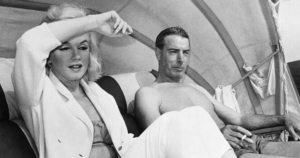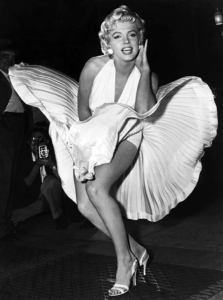Joe DiMaggio and Marilyn Monroe’s brief but intense marriage left a lasting impact on both. Despite their public divorce in 1954, DiMaggio’s deep affection for Marilyn endured, particularly after her tragic death in 1962. He arranged for fresh red roses to be delivered to her grave three times a week for 20 years, a ritual that spoke to his undying love and sense of guilt over their troubled relationship.

Their love story began in 1952, when they met on a blind date, and their marriage in 1954 seemed like a dream come true. However, their differences soon led to conflict, especially with DiMaggio’s jealousy and difficulty handling Monroe’s rising fame. The famous subway grate scene from The Seven Year Itch marked the breaking point, leading to their divorce just months later, with Monroe citing “mental cruelty.”

Despite their separation, DiMaggio remained a constant in Monroe’s life, providing support during her personal struggles. After her death, DiMaggio took charge of her funeral, keeping it private and barring Hollywood figures, including Frank Sinatra and the Kennedys, from attending. His grief was profound, and he sent roses to her grave for years, deeply mourning the loss and feeling guilt for the failure of their marriage.
Joe DiMaggio never remarried and kept Marilyn’s memory alive. Before his death in 1999, he whispered that he would soon be reunited with her, reflecting his lasting love and regret.
There is also some information about them that you may not know.
Joe DiMaggio and Marilyn Monroe’s relationship remains one of the most iconic and bittersweet love stories in American pop culture.
They met in 1952 through a blind date arranged by actor William Frawley, best known for his role in I Love Lucy. Despite their very different worlds—DiMaggio being a baseball legend and Monroe an emerging Hollywood star—the two were quickly drawn to each other. Their personalities were contrasting: DiMaggio was quiet, reserved, and traditional, while Monroe was vivacious, free-spirited, and rapidly rising to international fame.
They were married on January 14, 1954, in a small civil ceremony in San Francisco. At first, their union was widely celebrated by fans and the media. However, behind the scenes, tensions grew. DiMaggio struggled with Monroe’s public image and the attention she received. His jealousy and traditional expectations clashed with Monroe’s career ambitions and need for independence.
One of the major breaking points came during the filming of The Seven Year Itch, when Monroe filmed the iconic subway grate scene. DiMaggio, reportedly humiliated by the publicity and the sexualized nature of the scene, reacted angrily. Just nine months after their wedding, Monroe filed for divorce in October 1954 on the grounds of “mental cruelty.”
Despite the divorce, the two remained emotionally connected. In 1961, after Monroe was institutionalized in the Payne Whitney Psychiatric Clinic, it was DiMaggio who intervened and helped secure her release. He took her to Florida to rest and recover, and for a time, rumors of reconciliation spread. Monroe later clarified they were close again but not romantically involved.
After Monroe’s tragic death in 1962, DiMaggio took complete control of her funeral arrangements. He kept the service private and barred many Hollywood figures and high-profile personalities, including members of the Kennedy family, from attending. He reportedly blamed the entertainment industry for contributing to her decline and felt it was his responsibility to protect her in death.
For the next 20 years, DiMaggio had a dozen long-stemmed red roses delivered to her crypt three times a week. This quiet ritual became a powerful symbol of his enduring love and remorse. He never remarried, and he rarely spoke publicly about Monroe. According to close friends and family, he remained devoted to her memory for the rest of his life.
Shortly before his death in 1999, DiMaggio reportedly whispered, “I’ll finally get to see Marilyn,” a poignant final testament to a love that, while brief and tumultuous, never truly died.